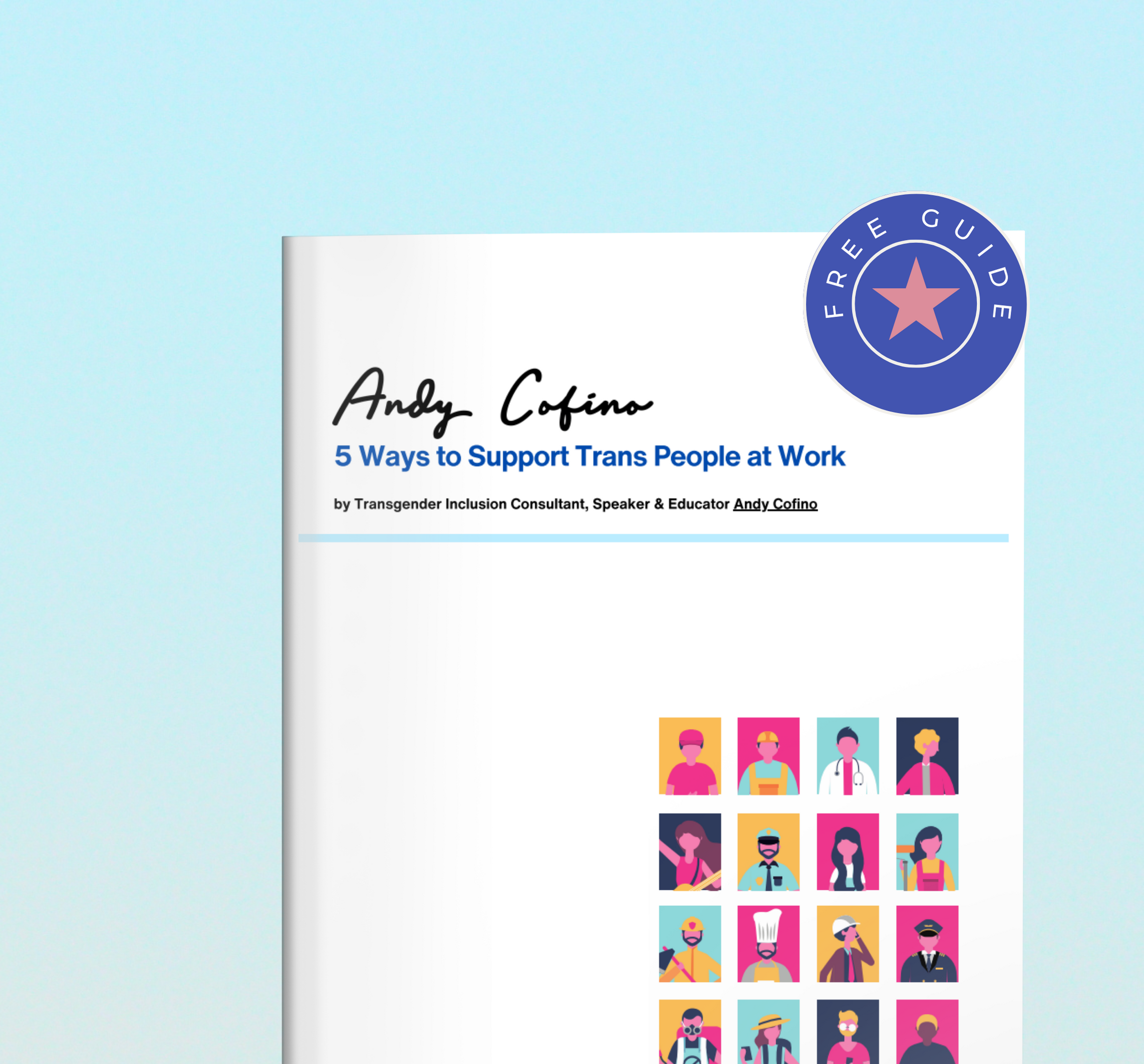Some questions for you to consider as you begin to assess LGBTQ+ inclusion at your company.

What Are Pronouns? A Guide
In this guide on pronouns, we cover the following topics:
- What are pronouns?
- Why are pronouns important?
- Why would someone use ze/zir/zirs/zirself pronouns? Why make it harder for people to refer to them?
- But they/them/theirs in the singular is grammatically incorrect!
- What’s the best way to learn someone’s pronouns?
- What do I do if I mess up someone’s pronouns?
- What if I don’t want to share my pronouns?
- What do I do if one of my co-workers uses the wrong pronouns for someone else in front of me?
- How can I get better at using different pronouns?
- A Free Quiz to Practice with Pronouns
What are pronouns?
Pronouns are words we use in place of a name to refer to someone. For example, instead of saying “Andy loves pizza,” you would replace my name with: “He loves pizza” because I use he/him/his pronouns.
Examples in English of pronouns include:
- She/her/hers/herself
- they/them/their(s)/themself
- He/him/his/himself
- Ze/zir/zirs/zirself
- No pronouns: Some people use only their name instead of pronouns.
Some people use more than one set of pronouns. For example, they may use both they and he pronouns (sometimes indicated as they/he in email signatures or on name badges). They/he means that person expects you to refer to that person using both sets of pronouns. For example, you might say in the same breath: “They love pizza. Neapolitan style is his favorite kind.”
If a person speaks more than one language, they may indicate pronouns in the other languages in addition to English. For example, a bilingual person may state that their pronouns are: they/she/ella/elle. This means you would use they and she while speaking English and ella and elle while speaking Spanish in reference to them.
Please note: pronouns are not “preferred” but rather they are the expected words you will use in reference to that person.
Why are pronouns important?
Referring to someone with their proper pronouns, similar to using the correct name, is a basic sign of dignity and respect. If you use the wrong pronouns for a transgender or nonbinary person (which is called misgendering), it is not only incorrect, but offensive. When repeated over time, using the wrong pronoun for someone can be a form of harassment. Depending on where you live, some state laws may protect transgender and nonbinary employees from this form of discrimination. For example, pronoun usage is protected under California’s Fair Housing and Employment Act.
When individuals share their pronouns with you, they are giving you the gift of knowing how to properly refer to them. When we misgender transgender and nonbinary people, it can cause feelings of stigmatization, and even increased depression and anxiety and decreased self-esteem.
Instead of assuming we know someone’s pronouns, it’s best to allow the other person the opportunity to share their pronouns with you. This can be done in a variety of ways, which I explain below.
Why would someone use ze/zir/zirs/zirself pronouns?
Why make it harder for people to refer to them?
Pronouns are deeply personal and unique to each person, which is why it’s hard to say why exactly someone would use a particular set of pronouns over another. Furthermore, I would also encourage you to consider from where you’re centering your question: would you rather focus on what you perceive will make conversations “harder” for you versus how you can be respectful of the people around you? Yes, it is challenging to learn new pronouns. But similar to meeting someone with a name you’ve never heard of before, if we are to be respectful of that person, we’ll do our due diligence to learn how to pronounce their name and will refer to them accordingly. Pronouns are similar.
But they/them/theirs in the singular is grammatically incorrect!
Actually, nearly every English language dictionary has explicitly stated that the use of they/them/theirs pronouns in the singular form is grammatically correct, including the Oxford English Dictionary, Merriam-Webster’s Dictionary, and dictionary.com. So has the Associated Press Stylebook. Using gender neutral pronouns in English is not new either. In fact, they/them in the singular was used in writing by Shakespeare, Jane Austin and Chaucer and people have proposed 200-250 new gender-neutral pronoun options since the 1780s!
What’s the best way to learn someone’s pronouns?
The simplest and easiest way is by simply asking, and I would encourage you to do so by beginning with sharing your own. For example, you can say “Hey, my name is Andy. You can refer to me with the pronouns he/him/his. What is your name and pronouns?”
What do I do if I mess up someone’s pronouns?
Usually the best thing to do when you mess up (which we’re all bound to do!) is to acknowledge the mistake, apologize clearly and succinctly, commit to using the correct pronouns, and then actually correct your language the next time you’re speaking about the individual.
Many people feel a sense of guilt or shame after they misgender someone. While it’s natural to respond this way, it’s important to not allow shame to disempower us from changing our behavior. As Brene Brown says: “Shame corrodes the very part of us that believes we are capable of change….We cannot grow when we are in shame, and we can’t use shame to change ourselves or others.” Instead, it’s important to acknowledge our mistake and use the mistake as an opportunity to learn and improve.
What if I don’t want to share my pronouns?
That’s okay! No one should ever feel forced into sharing pronouns, but rather there should be the opportunity for those who wish to disclose the opportunity to do so.
What do I do if one of my co-workers uses the wrong pronouns for someone else in front of me?
There’s not always a clear cut answer to every situation, but it is generally a good practice to speak up when you hear someone being misgendered. If you have a relationship with the individual impacted, you may also want to ask them how they would desire you respond in this situation so that you are responsive to your co-workers’ needs rather than assuming you know exactly how they would want the situation handled.
How can I get better at using pronouns?
The best way to improve is by practicing! Create a routine or ritual around practicing so you can improve each week. Set aside 5 minutes once a week or 10 minutes after every weekly staff meeting. Use the quiz I created below to test yourself!
Practice with pronouns with my free online quiz!
Practice by using this free quiz I created to help you practice with pronouns!
Photo from VICE’s Gender Spectrum Collection



